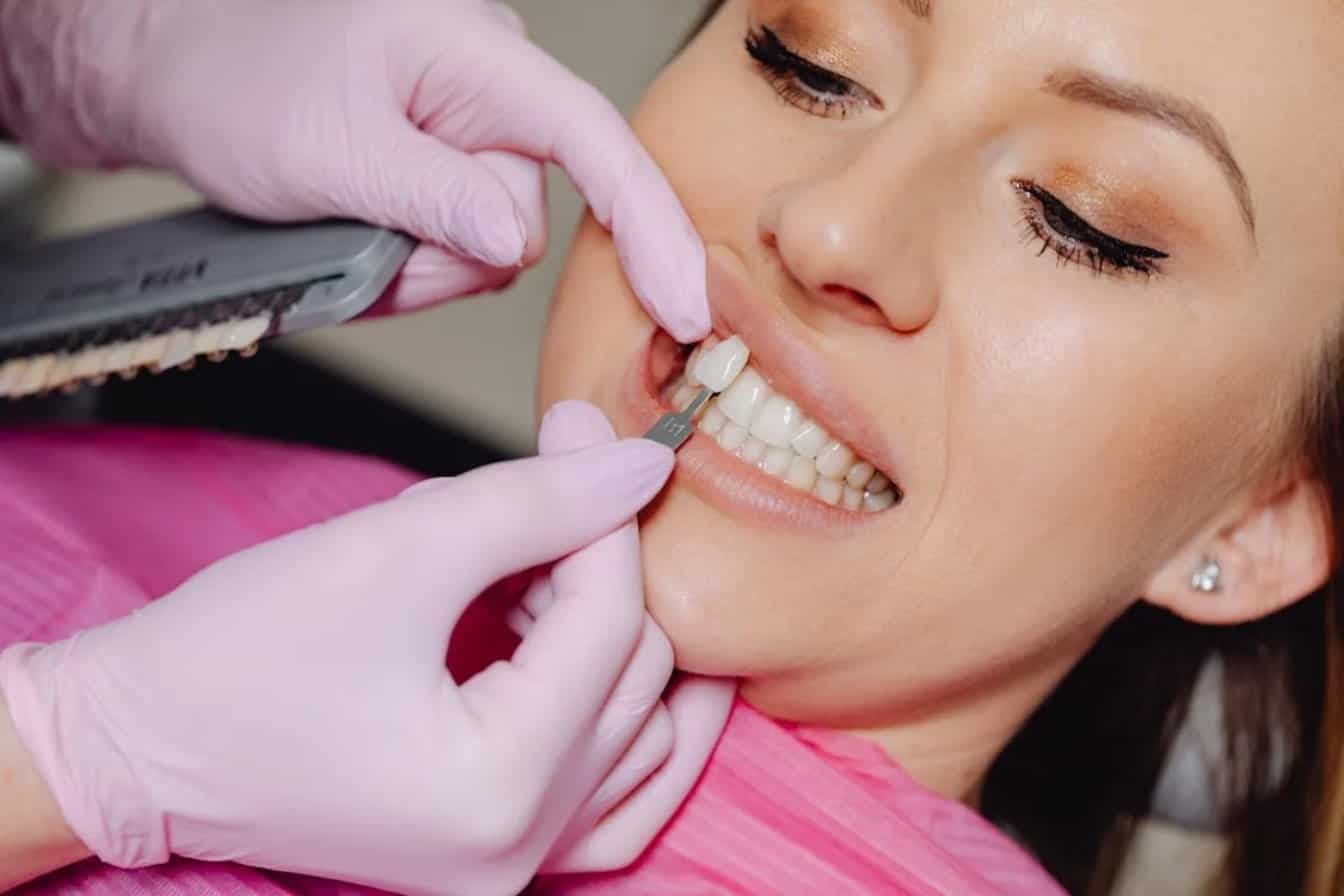Veneers can transform your smile by correcting discoloration, chips, and gaps for a flawless look that boosts confidence, but how much do they cost?
Prices vary based on the type of veneer, the number of teeth treated, and the dentist’s expertise. In this guide, we’ll break down costs, factors influencing pricing, and payment options to help you plan.
Key Points To Remember:
- Veneer costs in Chicago range from $900 to $2,500 per tooth, with a full set costing $15,000 to $40,000 or more.
- Porcelain veneers last 10–15 years, composite veneers last 5–7 years, and no-prep veneers last 7–10 years.
- Factors including the veneer type, number of teeth treated, dentist’s skill, and lab quality impact pricing.
- Insurance usually won’t cover veneers, but financing and in-house discount plans can make them more affordable.
Veneer Cost in Chicago
On average, the price per tooth ranges from $900 to $2,500. A set of veneers for the 6–8 visible top teeth can cost $5,000 to $20,000 or more. A full set covering all visible teeth on the top and bottom (usually 16–20 veneers) can cost $15,000 to $40,000 or more.
- Porcelain Veneers: Porcelain veneers cost between $1,200 and $2,500 per tooth, last 10–15 years, and offer a natural, stain-resistant appearance. However, they require enamel removal.
- Composite Resin Veneers: Priced at $900 to $1,500 per tooth, composite veneers last 5–7 years and can be applied in a single visit but are less durable and more prone to staining.
- No-Prep Veneers: Ranging from $1,000 to $2,000 per tooth, no-prep veneers last 7–10 years and require minimal or no enamel removal.
Factors That Affect the Cost of Veneers in Chicago
Veneers can transform your smile, but their cost varies widely, as every mouth is unique.
Number of Teeth Being Treated
The more teeth you choose to enhance, the higher the overall cost. Dentists often offer package pricing for multiple veneers, making it more cost-effective to treat several teeth at once.
Type of Veneer
Porcelain veneers are the most expensive due to their durability and natural appearance, while composite resin veneers offer a more affordable alternative but require more frequent replacement. No-prep veneers offer a minimally invasive option at a mid-range price point.
Technology and Techniques Used
Advanced technology, such as digital smile design and CAD/CAM milling, increases precision and customization but may raise the price. Hand-layered veneers, crafted by skilled technicians, often cost more than machine-made alternatives.
Quality of the Lab
High-end labs use premium materials and expert craftsmanship, which increases costs but ensures a more natural look and better fit. Budget labs may offer lower prices, but the results may lack durability and lifelike detail.
Skill of the Dentist
Highly experienced cosmetic dentists charge more for their expertise, but their skill ensures superior results. Choosing a less experienced provider may save money upfront but could lead to unsatisfactory results and additional costs for revisions.
Paying for Veneers
Because veneers are typically considered a cosmetic procedure, insurance usually won’t cover them. However, there are alternative payment options to make them more affordable.
Financing Plans
Many dental offices partner with third-party financing companies such as CareCredit or LendingClub, allowing patients to break the total cost into manageable monthly installments. These plans often feature low or no interest for qualified applicants.
In-House Membership Plans
Some dental practices offer in-house membership plans that provide discounts on cosmetic procedures, including veneers. These plans typically involve a monthly or annual fee in exchange for reduced costs on various treatments.
How Veneers Work
Veneers are an excellent option for correcting stained, chipped, uneven, or slightly misaligned teeth. They can close small gaps, improve symmetry, and enhance overall aesthetics, but patients must have healthy teeth and gums to provide a strong foundation.
The Procedure
First, the dentist preps the teeth by removing a thin layer of enamel. Next, impressions are taken, and temporary veneers may be placed. Once the custom veneers are ready, they are bonded to the teeth, creating a seamless, natural-looking smile.
Follow-Up Care
After placement, patients may experience mild sensitivity, which fades within days. Long-term care involves brushing, flossing, and avoiding habits like biting nails or chewing hard objects. Regular dental checkups ensure veneers stay in top condition for many years.
Enjoy an Improved Smile With Veneers
A confident smile can transform your appearance, your self-esteem, and the way you engage with the world. Veneers provide a lasting solution for a radiant, flawless smile that reflects the best version of you.
While cost may be a factor, many patients find the benefits far outweigh the investment. With proper care, veneers can offer over a decade of beauty and durability, ensuring your smile remains stunning for years to come.
If you’re considering veneers, now is the time to take the next step. Let the skilled dentists at Forever Dental help you achieve the smile you’ve always wanted.
Frequently Asked Questions
Are veneers permanent?
Veneers are long-lasting but not permanent. Porcelain veneers typically last 10–15 years, while composite veneers last around 5–7 years. Since a small amount of enamel is removed for placement, porcelain veneers are irreversible, meaning replacement is required when they wear out.
Are veneers worth the money?
Veneers can be a worthwhile investment for those looking to improve their smile. They enhance appearance, correct imperfections, and offer long-lasting results. While costly, their durability and aesthetic benefits make them an ideal choice for those seeking a flawless smile.
What happens to your real teeth under veneers?
Before placing veneers, a thin layer of enamel is removed, making the process irreversible. However, the underlying teeth remain intact and protected. With proper care, veneers help preserve your natural teeth while improving their appearance and function.
Are veneers painful?
Getting veneers is typically not painful. Local anesthesia is used during enamel removal to ensure comfort. Some patients experience mild sensitivity after placement, but this fades within a few days. Most find the procedure to be easily tolerated.

